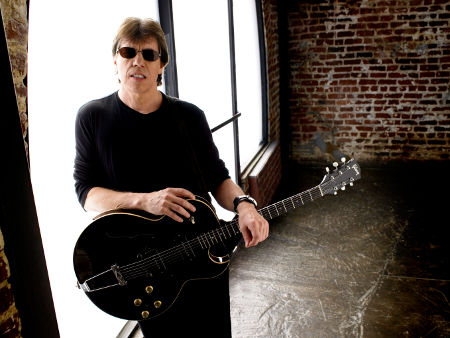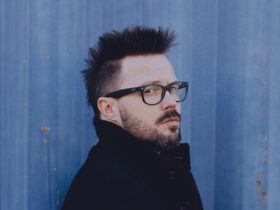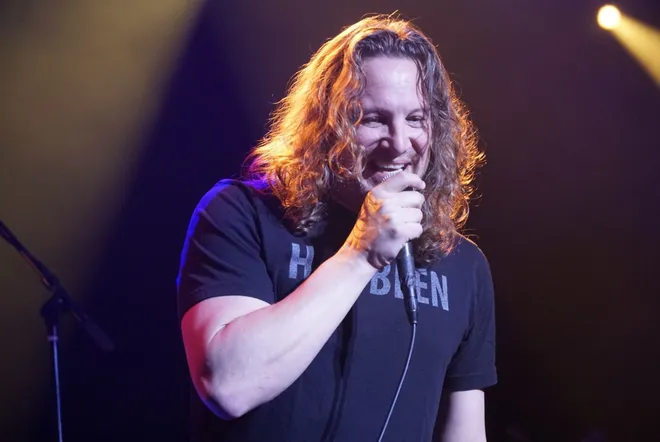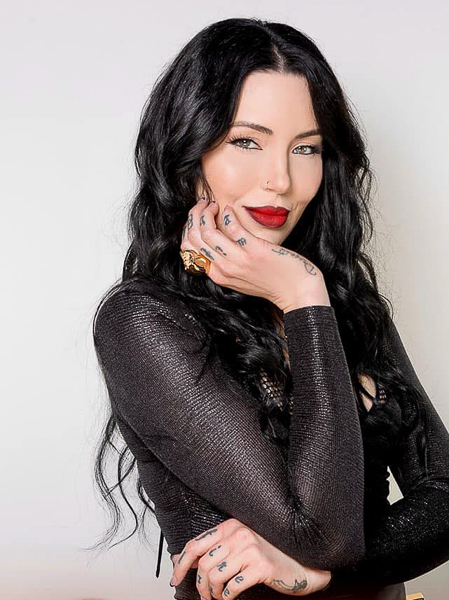George Thorogood has built a successful career as a live performer, getting his first big break in 1981 as the opening act for the Rolling Stone’s. His unique blues-based style is heard on hits like “One Bourbon, One Scotch, One Beer,” “Move it on Over” and” Bad to the Bone.” Thorogood recently spoke with Backstageaxxess.com about everything from his longevity to Muddy Waters to Radio Disney.
Thom: My first memories of George Thorogood and the Destroyers go back to 1981 when you opened for The Rolling Stones at Rich Stadium. Journey was also on the bill and I remember thinking that it was a strange triple bill.
George Thorogood: Really?
Thom: We all understood why you had the opening slot because your music is compatible with the Stones, but Journey seemed like an odd choice at the time.
George: Well you have to remember that The Rolling Stones are businessmen first and last. Journey had a number one song out at the time and an album that was really hot. Now I am the type of person that when I go out on a tour I try to make sure the two acts are compatible musically. The Stones will get somebody that is hot in the critic’s eye or really heavy in the charts. They did that with Guns and Rose. At the time Guns and Roses were outselling the Stones and that’s the same reason they got Journey for the 1981 tour. I understood why they worked with The J. Geils Band, because they were originally a blues band. People just don’t think that way anymore – Bill Graham used to- but all they think about now is who will sell tickets and if they have a big hit out. That is the world of the big-time promoters.
Thom: Do you ever look at some of the bills you are put on and say, “this just doesn’t make sense.”
George: A lot of the time, we manufacture the bill ourselves. Last year we worked with Johnny Lang and the summer before it was Buddy Guy. Therefore, we usually dictate whom we play with. Sometimes they hire us independently for concerts; we recently did one with Gary U.S Bonds on it and played a show with Journey over in Europe. We usually dictate who we want in the lineup with us and a lot of times promoters will say, “Well, I don’t know if that opening act will draw anybody.” The Destroyers are an enigma to book. We don’t sell enough records to fill up a big room like we used to, and at the same time we say we are willing to go on before somebody else does and the bands say, “Hold on. I’m not going on after Thorogood,” because we have such a heavy live act and so I say, then get somebody like ZZ Top or Steve Miller that is so legendary that it won’t matter.
Thom: It still must matter to some degree?
George: What I mean is that their act will be heavy because they have so many hits. We did that with Santana, because Santana is a God! So that worked. Many times, I will go to a contemporary of ours and say, “Let’s do a tour together” and they’ll say “No, I’m not going on after you,” and so I’ll tell that that they can go first and they’ll say, “No, I’m too big a star for that.” If it was up to me I’d say just book J.Geils, Steve Miller and us for the rest of our life and I don’t care who goes on when, but that is not how it works.
Thom: Is it better to be a great live act these days? It seems like the recorded product just doesn’t mean as much these days and that if a band is going to survive they have to be a great live act.
George: In the early days of the industry, the fifties, sixties,and it panned out in the seventies, people got hired because of their live act. That’s why they hired Elvis Presley. He didn’t even have a drummer and he was opening up for Hank Snow. Back then, everybody had a flashy live act, Little Richard, Chuck Berry and James Brown. That’s how you made your legacy, that’s how you got people’s attention, that’s how the Young Rascals got signed to Atlantic. Bands like The Rolling Stones and other people kept going to a club called “The Phone Booth” on Long Island, it was called The Phone Booth because it was so small and it was packed with people. The Young Rascals played there night after night and they finally got a record deal. That is how it used to happen and in some respects that is how it happened with us. You sold your act onstage and then you resold it on TV the way The Beatles did on the Ed Sullivan show, but that is not how it’s done anymore. Rarely do record executives say that there is a hot act playing down the street and you have to see them live. Look at Janis Joplin, she blew everybody away at Monterey Pop but before that nobody had heard of her, she had a record and it was barely out. She blew everybody’s mind and then Columbia went out and signed her right away. That was the name of the game, which is what I grew up around.
Thom: In order to survive in the industry you have to have a good live act, you certainly fall into that category.
George: That is my act, period! If you listen to the records you go, “Oh that’s nice, that’s interesting, that’s a pretty cool song,” and then you see us live and say, “I want all the records!” That is our act, it always has been and always will be.
Thom: And you still loving playing live don’t you?
George: I love it because I am successful at it. If I had done it all this time and had not been successful at it I might have said to myself, “Am I missing something? I know I am good at this.” That happened for awhile so I knew we had to get a record deal to get people’s attention. It was a case where one hand washed the other, Rounder Records saw us play live and they wanted us to make a record. Before that I was not going to go any farther than the 80 seat bar I was playing in until I got a record deal to get me out of it. I’m much happier about it now because my bills are paid and I have a trust fund for my daughter’s college and of course I am a lot happier than I was when I was 26 and sleeping on people’s floors while telling them I was going to be great someday. (laughs)
Thom: Do you accept your greatness?
George: I guess I wouldn’t use the word “greatness,” I just accept where we ended up. I accept that because it’s where I wanted to end up. There was a pitcher for the Dodger named Orel Hershiser, and in 1988 he was starting the second or third game of the World Series and all the writers were questioning him and somebody said “Orel, we are so impressed with your poise, you are so relaxed, so confident and this is the World Series.” Finally someone said that to him once too often and he wasn’t angry but he looked at the guy and said, “Listen, I’m not surprised about being here, I have been working on this since I was ten. This is my destiny, to pitch in the World Series, it has been my project since I was ten.” I understood that. Orel wasn’t shocked that he was in the World Series, and that’s not being conceited, that is what he planned and I admire that.

Thom: At what point did you know you were going to make it?
George: I guess it’s when you pick up a guitar and play for some people and they say “You should make records someday.” That is when you know it.
Thom: It seems like there were some of the old blues guys that didn’t really make it.
George: Like who?
Thom: Well Muddy Waters certainly wasn’t appreciated for a large part of his career and went through a very dark period.
George: Everybody goes through dark periods when you are in a business. You couldn’t get near Muddy Waters in 1952, at that time he was as big in Chicago as Sinatra was in Vegas. He was the top bluesman, Muddy was always successful. There was a dip in the early 1960s then there was a blues revival after the English guys came along. Then Muddy was back on track. As long as you’re playing and putting out quality records you’re making it. It is kind of like saying, “Oh he’s batting seventh for the Phillies” and I say, “Wait a minute, he’s still in the majors!” Muddy was always successful. I opened for him, people were paying money to see him play, that is the bottom line. Then people say he should have been more successful, which he would have been if he recorded something like “Superstitious” he would have been bigger, but he was still big. It just depends on the person; what level of success is considered “big,” but in reality you are only as big as your hits. It’s really not how great you play or whatever, it’s the material you put out that gets you to the level of “big.” Look at B.B King, “The Thrill is Gone” got him on The Ed Sullivan Show. Without that song I don’t think he would have made it. I have had people come up to me and say, “How come you are doing so much better than me, I play better than you do and you used to open for me.” I tell them, “I’ll give you three reasons, “Bourbon, Scotch and Beer,” “Move it On Over,” and “Bad to the Bone.”(laughs) And I’ll tell you that is why Muddy kept working while other blues guys didn’t, Muddy had “Hoochie Coochie Man” and “Got My Mojo Working.” They were blues hits. Everybody hopes to get a big song. Tom Jones, when he was twenty four, he was almost ready to cash it all in. He was really despondent and didn’t know what he was going to do, and then someone asked him if he would sing a demo for a new movie called “What’s New Pussycat.” He didn’t think much of it but the movie comes out six months later and the next thing you know Tom Jones isn’t playing in bars anymore.
Thom: Muddy Waters is a legend and you worked with him and The Rolling Stones. After meeting them and working with them did your opinion of them change?
George: No, the only opinion I had about them was that they had great music.
Thom: Do you ever get star struck being around those guys?
George: Always! I always have, always do and always will be. I first met Bo Diddley in 1979, and then I ran into him again in 1982 and we made a video
together. Then we performed together at Live Aid in 1985. I bumped into him numerous times and not long ago our tour manager from England asked “Who is this Bo Diddley bloke anyway?” I told her who he was and she asked if I knew him and I told her we performed together, did a video together, I talked to him on the phone. But I’ll tell ya, every time I saw that guy walk onstage I thought (screaming) “That’s Bo Diddley!” I never lost that.
Thom: With regard to your style, you have hit on a formula that really works. So many artists seem to struggle with the notion of sticking with a tried
and true formula. Have you ever been to a point in your carreer where you said, “Man, I have got to change things up and do something different.”
George: All the time! (laughs) But I can’t. I listen to guys like Marty Robbins, Willy DeVille, Chris Isaak or Jack Johnson and think, “I would like to do something like that,” but when I try it things get really dirty really fast. Usually in about 14 seconds! (laughs)
Thom: What do you have to lose at this point of you try something different?
George: There is no need to, it is an exercise in futility. Do people want to see Woody Allen make a Western? John Wayne do Shakespeare? You strike a nerve or a vein with an audience and you stick with it. That’s what I did and that’s why you are talking to me right now.
Thom: Do you wonder why some artists abandon what works?
George: You can’t please everybody, if you stick with the same bag critics call it “the same old thing” and say “when is he going to change?” When you do something different they say “what the hell you doing that for?” You can’t win with the critics so you may as well play for the people that support you. The people want more “no respect” jokes from Rodney (Dangerfield) and why do you think there were five Rocky movies? There’s a demand for it. If you own a restaurant that is packed every night and everything on the menu is selling, why change it? I look at myself as a restaurant owner, I feed the people the music they want to hear. I say “What do you want?” They say “Bourbon, Scotch and Beer,” and I say, “You Got It!”
Thom: So what are you listening to these days?
George: Jonas Brothers, Miley Cyrus. Radio Disney. I got a twelve year old! I have no choice about what I want to listen to! (laughs)
Thom: One final question, there were rumors floating around a while ago that you were being considered as a replacement for Ron Wood in The Rolling Stones. If they asked you to take the job would you?
George: I heard that rumor before but they never approached me.
Thom: If they had, would you have taken it?
George: No way, I want Jagger’s job! If they want to replace him, then I am ready! Put me out front, I don’t need the guitar. If you want me to join that band, that is the position I want!
We would like to thank Tony Prado from Lobeline Communications for setting up the Interview with George. For more information on George and his current touring information (he will be playing Artpark in Lewiston, NY on July 27, 2010), please go to: http://www.georgethorogood.com/.






